As A University Student Whose Course Load Is Heavily Math-based, I’ve Had My Fair Share Of Encounters

As a university student whose course load is heavily math-based, I’ve had my fair share of encounters with math problems that seem unsolvable, and notes that make absolutely no sense. Fortunately, I’ve also come across a lot of useful resources that I thought I would share with my fellow math comrades! So here is my list of “life-saving” math resources that will hopefully make your math life a little bit easier.
Wolfram Alpha
Definitely the most used resource when I am doing math homework. It’s capable of solving basically any math problem. You have to pay to see the step-by-step solution, and I have a shared account with my friend, so that’s an option if you want to pay a little bit less!
Symbolab
Similar to Wolfram Alpha, but free! You can see the step-by-step solutions without paying, so that’s great. However, the downside is that if your math problem is quite complicated, it may not have the solution (i.e. crazy integrals)
Paul’s Online Math Notes
This website has notes on algebra to multivariable calculus, with plenty of examples and explanations. This is an actual life saver for my friends who are doing advanced/university level math. Especially if your professor has atrocious writing but can’t seem to stray away from hand written notes.
Khan Academy
Has video lessons on elementary to university level math. Great for visual learners, since the lessons include a lot of graphs and diagrams. Not to mention this website offers video lessons on a variety of subjects!
Desmos
Graph functions (single and multivariable) and plot data tables!
Slader
Textbook solutions!!! You can probably find the solutions to most of the calculus textbooks used in universities. Really great for those who like to study by doing a bunch of practice questions.
Bonus: Scannable (not really math related, but still useful)
For those with professors who prefer digital submissions of assignments: turn your phone camera into a scanner without the bulk. The best scanner app I’ve come across - it will make your papers look like they’ve actually been scanned, even if you take the photo in bad lighting.
More Posts from Wandererklary and Others
Academic Writing Resources
General:
The Five-Paragraph Essay
Using Punctuation Marks
Deadly Sins Checklist
Formatting Your Paper
Writing About Literature
Basic Essay
Revision Checklist
Planning and Organization
Editing and Proofreading
Latin Terms
Essay Structure
Tips on Introducing Quotes
Academic Writing Tips
Introductions:
Introductory Paragraphs
Introductions
Writing an Introduction
Preparing to Write an Introduction
Introduction Strategies
The Introductory Paragraph
Writing Effective Introductions
In The Beginning
Introductions and Conclusions
The Introductory Paragraph
Writing Introductory Paragraphs
How to Write an Intro
Body Paragraphs:
Paragraph Development and Topic Sentences
Transitions
Transitions
Transitions
Four Components of an Effective Body Paragraph
Writing Paragraphs
Paragraph Development
Body Paragraphs
Body Paragraphs
Strong Body Paragraphs
Body Paragraphs
Writing Body Paragraphs
How to Write Body Paragraphs
Writing the Body
Writing Body Paragraphs
Body Paragraphs
Body Paragraphs that Defend a Thesis
How to Write Body Paragraphs
The Perfect Paragraph
Topic Sentences:
Topic Sentences
Writing Topic Sentences
Topic Sentences
Topic Sentences
The Topic Sentence
Paragraphs and Topic Sentences
The Topic Sentence
Topics, Main Ideas, and Topic Sentences
Writing a Good Topic Sentence
Good Topic Sentences
Conclusions:
Writing Effective Conclusions
Introductions and Conclusions
Conclusion Paragraphs
Conclusion Strategies
Conclusions
Tips for a Strong Conclusion
The Concluding Paragraph
Ending the Essay
Types of Conclusions
Writing a Strong Conclusion
How to Write a Conclusion
Writing Conclusions
Guide to Conclusions
Thesis Statements:
The Thesis Statement
Thesis Statements
Writing a Thesis Statement
Thesis Statement
Tips and Examples
Writing a Thesis
Writing the Thesis
How to Write Your Thesis
The Thesis
Thesis Statements
Guidelines for Writing a Thesis
Thesis Statements
Thesis
Thesis Statements
The Thesis
Create a Strong Thesis
How to Write a Thesis
Developing a Thesis
Guide to Writing Thesis Statements
Thesis Statements
Citing:
When to Cite
APA Documentation
MLA Documentation
Suggestions for Citing Sources
Research and Citation Resources
Citation Information
MLA Guidelines for Citing Poetry
MLA Style for Poetry
How to Format Your Paper
Argumentative Essays:
Argumentative Essays
Argument
Argumentative Essays
Persuasive or Argumentative Essays
Argumentative Essay
Argument/Argumentative
Argumentative Essays
How to Write a Good Argument
How to Write an Argumentative Essay
Writing Conclusions to Argumentative Essays
Argumentative Essay
Persuasive Essay Writing
Writing Concluding Paragraphs
Constructing the Argumentative Essay
Writing About Poetry:
Writing About Poetry
Writing About Poetry
Writing About Poetry Q & A
Poetry Explications
Writing About Poetry
Writing About Poems
Explicating a Poem
Writing About Poetry
Writing a Thesis Paper About a Poem
How to Start a Poetry Introduction
Poetry Essay Structure
Poetry Explication
Expository Essays:
Structure of a General Expository Essay
Expository Essay Examples
Sample Expository Essay
Expository Writing
Expository Essay Model
Elements of Expository Essays
Expository Writing Information
Expository Essays
Writing Expository Essays
How to Write an Expository Essay
Tips on Writing an Expository Essay
Expository Essays
Essay Map
Writing Expository Essays
How to Create a Strong Expository Essay
Expository Essay Writing
The Expository Essay
Research Papers:
How to Write a Research Paper in Literature
Writing a Research Paper
The Research Paper
How to Write a Research Paper
Five Paragraph Research Paper
Sample Research Paper
Writing a Research Paper
Tips for a Research Paper
How to Write a Research Paper
Writing a Scientific Research Paper
Writing Research Papers
Research and Writing
Research Papers that Rock
How to Write an Effective Research Paper
College Application Essays:
Application Essay Tips
Application Essays
Tips
10 Tips
Application Essays
How to Write a College Application Essay
Tips for an Effective Essay
Do’s and Don’t’s
College Application Essay
How to Write a College Application Essay
Narrative Essays:
Narrative and Descriptive
Narrative Essay Writing
The Personal Essay
Narrative Essays
Narrative Essays
Writing Narrative Essays
Narrative/Descriptive
Narrative Essay
Writing a Narrative Essay
Tips on Writing a Narrative Essay

Just a lil side note: i almost failed maths in grade 5-8. Now, I’m doing 2 Maths subjects (straight A+’s) and ranked the third highest in my class for the harder maths subject (out of 20 students). You can do anything if you set your mind to it. Be persistent. Happy studying! :)
1. Keep up do date with the class
Even if the teacher doesn’t set homework, there is always an expectation that whatever excercise isn’t finished in class, you do at home! My maths class moves very fast (we do about 3 concepts/excercises each class) and so its crucial that the first thing I do when I get home, is finish off my maths questions! This is particularly important in the learning process, because if you understand it when you learn it, you will be far ahead of anyone else in an upcoming test- all you will need to do is revise!
This means:
- don’t sit next to anyone distracting
- work efficiently in class
- the time that your waste in class, is the time you will have to spend at home
2. Do ALL the practice questions in your textbook
In my harder maths class, there are about 20 questions per excercise/concept (100+ per chapter) and so we might only get told to do about half of that. But, I strongly reccommend doing all of the questions! It is great practice and really consolidates your learning!
ALSO, as the questions go on, they tend to get harder. DON’T GIVE UP IF THEY’RE TOO HARD. Ask the teacher’s help, persevere, or look for a video on YouTube. These are the questions that will most likely be in your tests/exams.
If you can do the hardest question, you can most likely do all the questions!
If you get a question wrong, do AT LEAST 5 more of the same style, make sure you know it well!
3. Practice is everything
You cant really study for maths the same way that you might study for science. There is nothing to memorise (apart from formulas, but the best way to remember them is to practice). Studying for maths IS doing practice questions. That’s all there is to it.
- listen to some tunes (music with lyrics is fine for maths!)
- put on a movie ( just try to not get too distracted)
- find a comfy space
- just start studying.
4. How to study for maths when you’re sick of it all
Humans are creatures of habit. We like routines and we stick to them. BUT, studying maths can become tedious if you are constantly doing the same thing every time.
CHANGE IT UP Y'ALL:
- ditch the notebook and pencil. Buy some non-permanent glass markers and do some maths on your windows or mirrors! I do this ALL THE TIME! It’s actually really fun and it makes me feel like Russell Crowe from ‘A Beautiful Mind’ (haha). Alternatively, you could also use a whiteboard if you have one!
- study in the library or another part of your house!
- buy some different stationery (this is always so fun)
5. For an upcoming test…
do all the chapter review questions in your textbook. These tend to be a compilation of all the most important questions you will need to know. Take your time, don’t give up.
Seek external resources for questions. I own other revision books for maths that isn’t part of my school’s recommended material. These really help when you need more questions to test yourself on.
Do practice papers. THESE ARE CRUCIAL. Most of the time, the material that they test you on will be from past papers, the questions are the same, but they change the numbers!
Take a deep breath. Drink some water. Focus. Time management is the issue for most people (including me :)), so when you feel like a question is too challenging, move on, come back to it when you finish with a fresh mind!

Made a set of simple printables, because I was missing some things before the start of the school year.
HABIT TRACKER: https://drive.google.com/file/d/0B0G5JxeNcPPZemdlRUNGTHFCNk0/view?usp=sharing
THIS WEEK: https://drive.google.com/file/d/0B0G5JxeNcPPZS08xZlZhRmp1WWc/view?usp=sharing
MEAL PLANNER: https://drive.google.com/file/d/0B0G5JxeNcPPZYTRvNFFiTW8xLVk/view?usp=sharing
THIS MONTH: https://drive.google.com/file/d/0B0G5JxeNcPPZc3RnQ2ZLS05GMmM/view?usp=sharing

Grade Tracker Pack 1.0!
I was already making these when an anon asked for them!
Comes in 5 versions: for the class itself, and for its classwork, homework, quizzes, and tests
Box to write what class the printable is for
Box to write notes in
Chart to the left to name the numbers and write out the grade %s
Chart to the right to dot-in grade percents and see how they change
Comes in landscape A4 and letter page size
Comes in PDF and JPEG file format
Rules & Information
Please do not steal, claim as your own, or redistribute; basic rules apply. Read more on my printable page
As a thank you to my followers, this printable doesn’t use AdFly :)
Download here!
My Printables Page & Tag | Requests are always open!




Weekly schedule printables (A4) in 4 different colours || Feel free to use/ download || Instagram







How to Use the Exam Study Pack: A Help Guide
Here’s some suggestions on how to use my exam pack printable in case you needed some inspiration. Be creative! Have fun with your studies!
How many types plot structures are there and how are they used?
Hiya! Thanks for your question! Plot structures are important for creating a good story.
There’s an infinite amount of plot structures depending on the story you’re telling. Some types are better than others within certain genres. Here are the most common plot structures, and how they’re used:
The Four Main Plot Structures:
Freytag’s Pyramid:
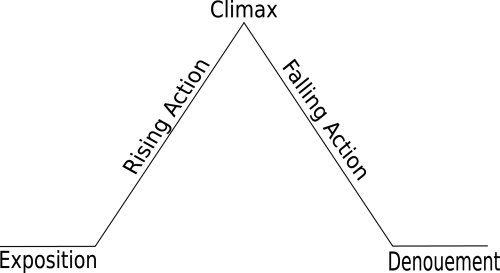
Also known as dramatic structure, this is the most simplistic of plot structures, and probably the one you were taught in elementary school. In this type of story structure, the climax falls in the middle, and the latter half of the story consists of falling action and the resolution. This was developed to analyze Greek and Shakespearian plays that use a five-act structure.
Why it’s good: It allows authors to explore the consequences of one’s actions. It’s also good for story analysis.
Why it’s bad: Long resolutions get boring fast. Modern novels don’t use this because no one wants to read a story where the villain is defeated in the middle.
When to use it: Children’s books and short stories
It’s good to use in children’s books because the goal of most children’s books is to teach kids a lesson. Using Freytag’s Pyramid gives writers the chance to teach kids the consequences of doing something wrong (lying, bullying, etc.). It works in short stories because the limited length prevents the denouement from being too long and boring the reader.
Examples: Any of Shakespeare’s plays
The Fichtean Curve:
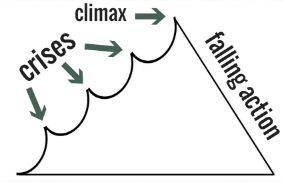
This is what most modern novels use, no matter the genre. The Fichtean Curve features a varying number of crises (or mini-climaxes) within the rising action to build up to climax about two-thirds of the way through the story. The falling action is short and used to wrap up loose ends or establish a new way of life for the characters.
Why it’s good: Putting crises throughout the story will keep readers hooked until the end. It also helps to keep good pacing. Despite being frequently used, this structure is loose enough that anyone can use it and make it unique for their own story.
Why it’s bad: Too much action can be overwhelming. This structure also doesn’t work well with certain story types such as Voyage and Return, Rebirth, or Comedy.
When to use it: Action-packed stories, Overcoming the Monster plots, or Quest plots
Examples: Night Circus by Erin Morgenstern, World War Z by Max Brooks, or Red Queen by Victoria Aveyard
The Hero’s Journey:
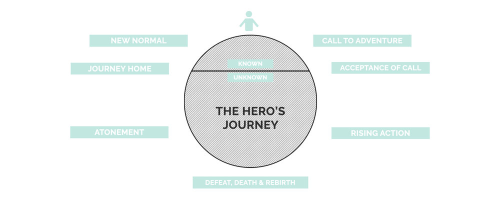
Another common plot structure that is seen in modern novels (especially western literature), and can be combined with the Fichtean Curve. Often, modern novels are a combination of the two. What makes the Hero’s Journey unique is that the protagonist must go through a literal or figurative death that completely transforms them. The death is usually, but not always, the climax of the story. Another key difference in The Hero’s Journey is that the protagonist must atone for their past rather than overcome it or move on without going back.
Why it’s good: Allows for great character development in character-strong stories.
Why it’s bad: Nearly every western novel, film, or TV show (successful and unsuccessful) uses this plot structure. It’s a little overdone, but if you can put a good personal twist on it, it can work out just fine.
When to use it: First-person stories, stories with small casts, Voyage and Return plots, or Rebirth plots
Examples: To Kill a Mockingbird by Harper Lee, The Lightning Thief by Rick Riordan, or Divergent by Veronica Roth
In Media Res
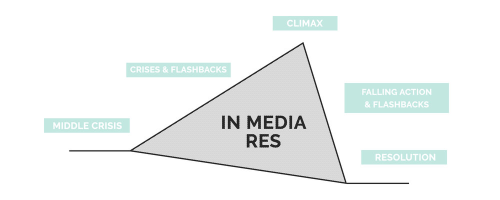
Latin for “in the middle of things”, In Media Res is a unique plot structure. Rather than start with an exposition that builds up to the action, In Media Res starts right in the middle of the story. If you were to start your story at the second or third crisis point of the Fichtean Curve, you would get In Media Res.
Why It’s Good: Dropping people in the middle of the action will hook the right from the beginning.
Why It’s Bad: Starting with the action can be disorienting for readers. Make sure you fill in the backstory as the plot moves on.
When to Use It: Stories with small casts, Crime plots, or Mystery plots
Examples: Hatchet by Gary Paulsen, The Lord of the Flies by William Golding, or The Iliad by Homer
There are plenty more plot structures, but these are the main four, and all others are based off these in some way. Keep in mind that most stories use a combination of these plot structures, so you don’t have to stick to just one.
Thanks again for your question! If you need help with anything else writing related, feel free to send in another ask. Happy writing!
- Mod Kellie
If you need advice on general writing or fanfiction, you should maybe ask us!

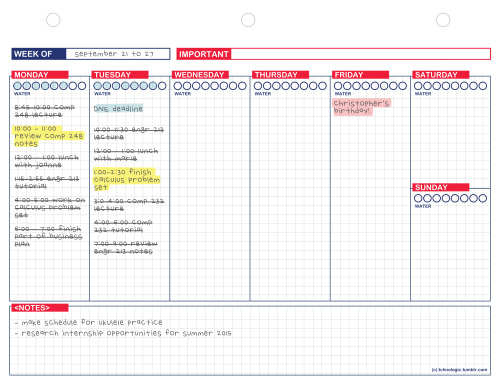
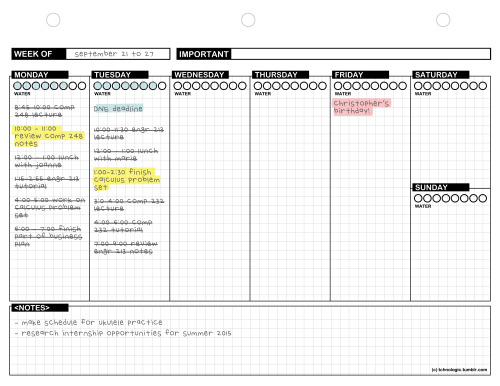
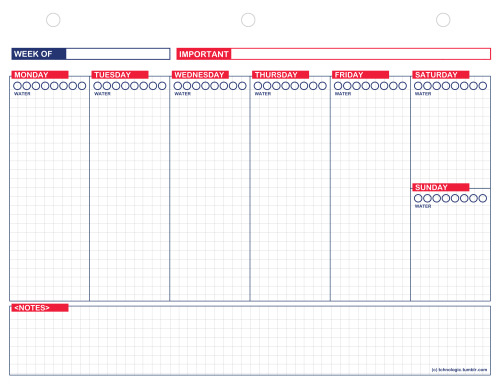
Weekly Planner Printable
I made this weekly printable schedule which you can download for free.
colour version
black and white version
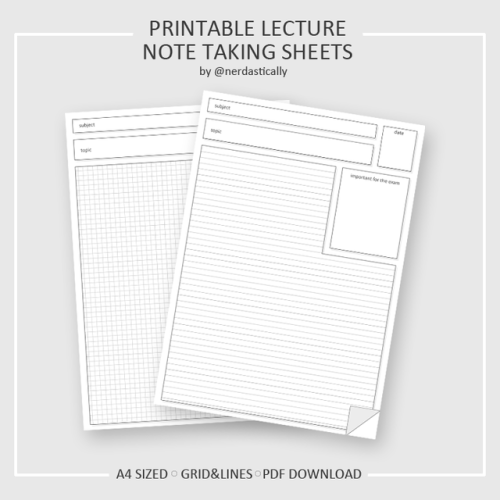
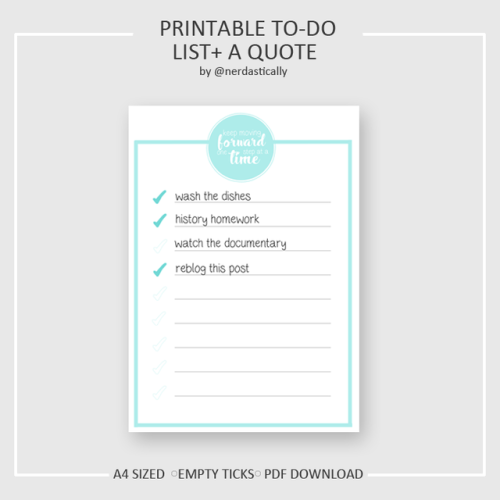
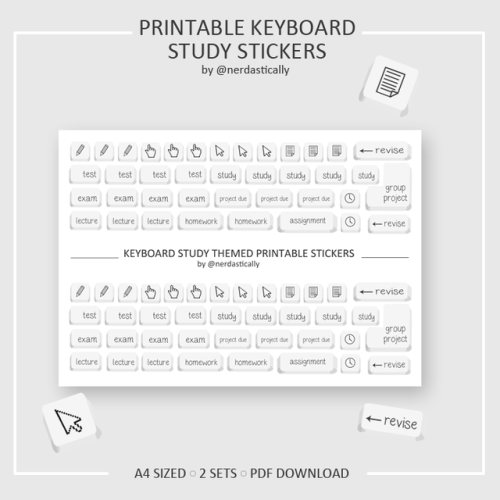
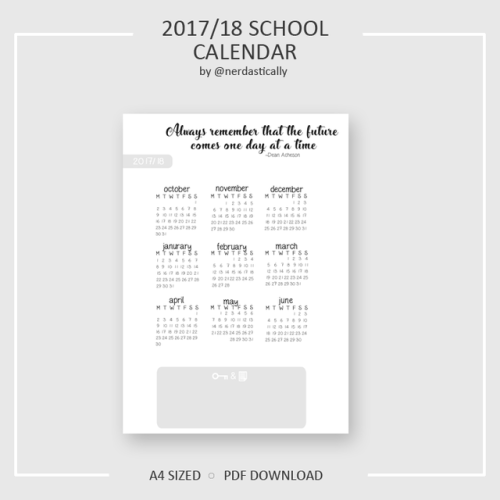
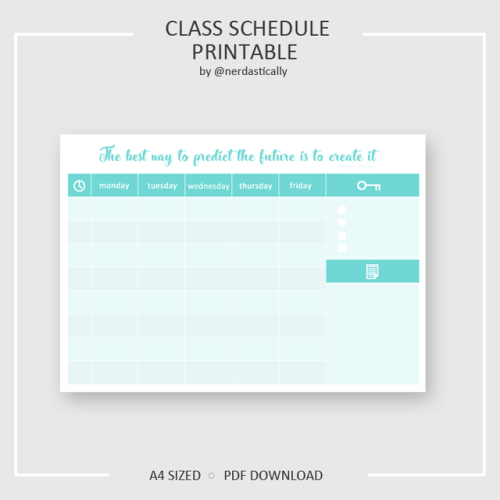
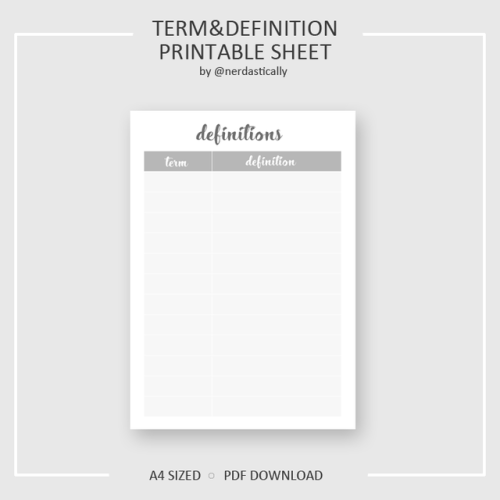
✨ back to school printables bundle ✨
back to school season has started, yay! As a ‘thank you’ to all 1000 people who followed me I made this printables bundle with everything you may need during your school year. I’m on uni so this is more of a ‘back to uni’ thingy, but I bet hs students will make a great use of it too! Anyway, thank you for following me and here goes!
Click one of the links below to download a PDF file:
▪️ grid note taking sheet [prev] ▪️ lined note taking sheet ▪️ to do list ▪️ keyboard stickers ▪️ 2017/18 school calendar ▪️ class schedule [prev] ▪️ term+definition sheet [A BUNDLE DOWNLOAD] - a zip file including more colors & PNG files! Please reblog/like this post if you found this useful!
-
 myh0pew0rld liked this · 1 month ago
myh0pew0rld liked this · 1 month ago -
 in-which-i-seek-understanding reblogged this · 10 months ago
in-which-i-seek-understanding reblogged this · 10 months ago -
 deadly-nightshade-5 liked this · 10 months ago
deadly-nightshade-5 liked this · 10 months ago -
 dogboypawjob reblogged this · 1 year ago
dogboypawjob reblogged this · 1 year ago -
 estel-and-agape reblogged this · 1 year ago
estel-and-agape reblogged this · 1 year ago -
 estel-and-agape liked this · 1 year ago
estel-and-agape liked this · 1 year ago -
 selfconstructiontheblog liked this · 1 year ago
selfconstructiontheblog liked this · 1 year ago -
 letssgolesbians liked this · 2 years ago
letssgolesbians liked this · 2 years ago -
 girll55 reblogged this · 2 years ago
girll55 reblogged this · 2 years ago -
 azumios liked this · 2 years ago
azumios liked this · 2 years ago -
 bagelsdiaries liked this · 2 years ago
bagelsdiaries liked this · 2 years ago -
 girll55 reblogged this · 2 years ago
girll55 reblogged this · 2 years ago -
 girll55 liked this · 3 years ago
girll55 liked this · 3 years ago -
 anoyint reblogged this · 3 years ago
anoyint reblogged this · 3 years ago -
 pdove reblogged this · 3 years ago
pdove reblogged this · 3 years ago -
 happilymysticdestiny liked this · 3 years ago
happilymysticdestiny liked this · 3 years ago -
 spineless-juggler liked this · 3 years ago
spineless-juggler liked this · 3 years ago -
 morangodeplastico liked this · 3 years ago
morangodeplastico liked this · 3 years ago -
 3astroaxolotl3 liked this · 3 years ago
3astroaxolotl3 liked this · 3 years ago -
 smokingaway-ourmemories liked this · 3 years ago
smokingaway-ourmemories liked this · 3 years ago -
 hatikvah liked this · 4 years ago
hatikvah liked this · 4 years ago -
 lilosvegas liked this · 4 years ago
lilosvegas liked this · 4 years ago -
 kirasboyd reblogged this · 4 years ago
kirasboyd reblogged this · 4 years ago -
 may-bcxo liked this · 4 years ago
may-bcxo liked this · 4 years ago -
 ranawilliams liked this · 4 years ago
ranawilliams liked this · 4 years ago -
 tinasstudyblr liked this · 4 years ago
tinasstudyblr liked this · 4 years ago -
 swinginclamdragoncloud liked this · 4 years ago
swinginclamdragoncloud liked this · 4 years ago -
 madu-error-404 liked this · 4 years ago
madu-error-404 liked this · 4 years ago -
 jbrightraven liked this · 4 years ago
jbrightraven liked this · 4 years ago -
 nonstoplive liked this · 4 years ago
nonstoplive liked this · 4 years ago -
 amiapolyglot reblogged this · 4 years ago
amiapolyglot reblogged this · 4 years ago -
 haha1ahahaha liked this · 4 years ago
haha1ahahaha liked this · 4 years ago -
 studyingfluff reblogged this · 4 years ago
studyingfluff reblogged this · 4 years ago -
 hauntedpizzapeanut liked this · 4 years ago
hauntedpizzapeanut liked this · 4 years ago -
 eltorthintalo liked this · 4 years ago
eltorthintalo liked this · 4 years ago
